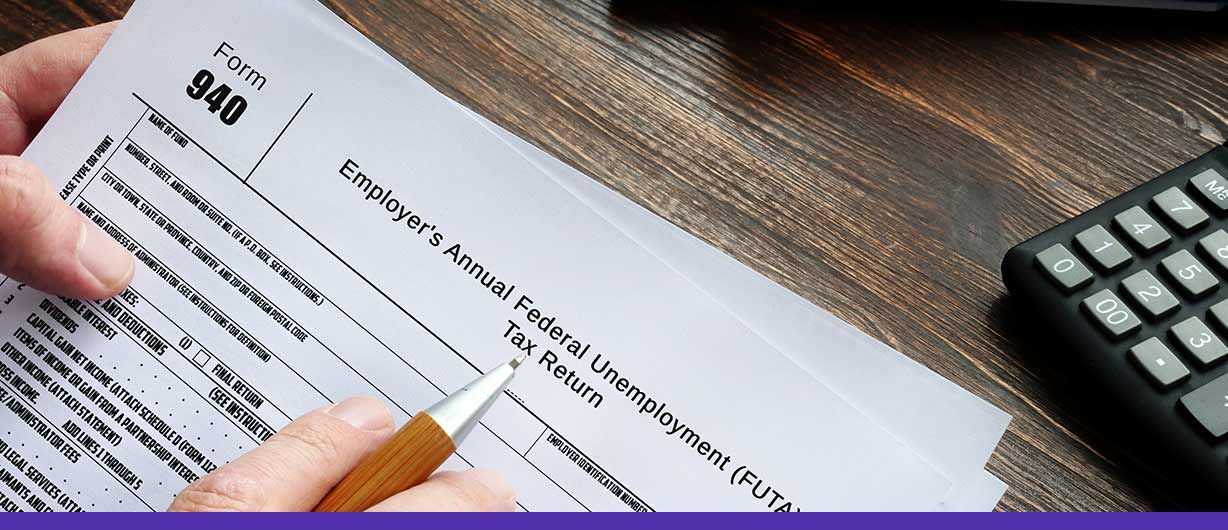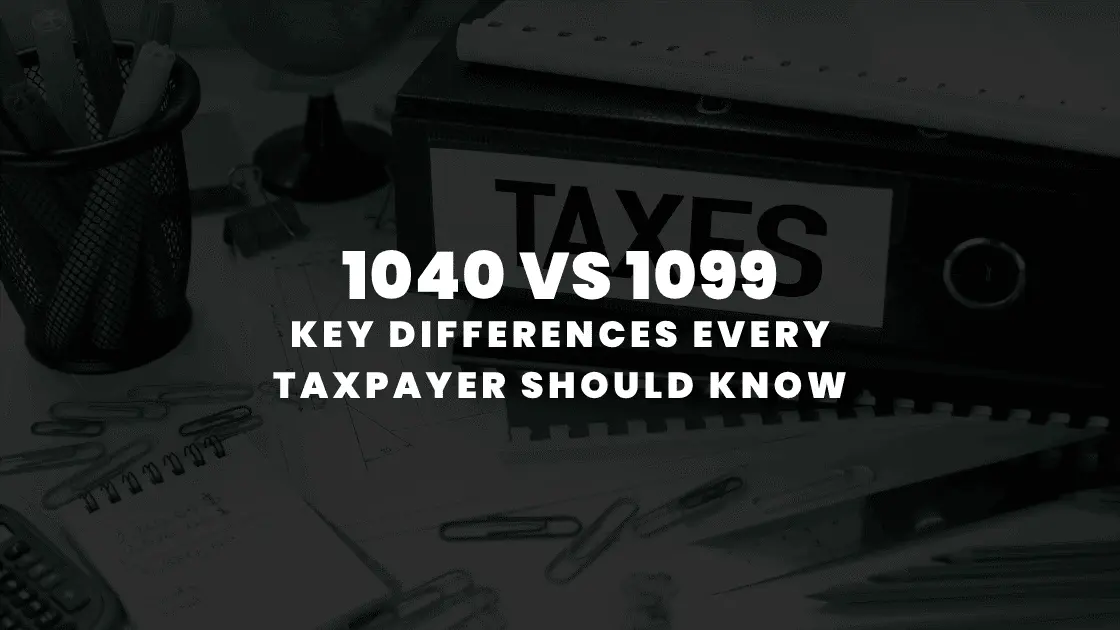September 28 2023 | By Farwah Jafri | 7 minutes Read

What is Form 940?
About FUTA tax? Tax Form 940
Special FUTA Tax and Form 940 Regulations
FUTA Tax Exemptions
Instructions for Completing Form 940
Filing Deadline for Form 940
Submission of Form 940
Form 940 is structured into seven distinct sections:
Section 1
Section 2
Section 3
Section 4
Section 5
Section 6
Section 7
Endnote
Have you hired any employees for your small business this year? Managing employment taxes, specifically federal unemployment (FUTA) taxes, is essential when you have a workforce.
Each staff member on your payroll must allocate a portion of their earnings towards federal unemployment taxes. Submit these tax payments to the IRS and report your tax obligations using Form 940.
Now, let’s delve into what Form 940 entails, which businesses must file, and how the filing process works. Before we proceed with Form 940, it’s crucial to have a comprehensive understanding of your responsibilities concerning FUTA tax liabilities.
Form 940, the Employer’s Annual Federal Unemployment (FUTA) Tax Return, is the official document that employers submit to the IRS to report their annual FUTA tax obligations.
You are required to file a Form 940 tax return if you meet any of the following criteria:
1. You have disbursed wages of at least $1,500 to any employee within the standard calendar year.
2. You have had an employee, whether temporary, part-time, or full-time, work at any point for 20 or more weeks throughout the year. These 20 weeks do not need to be consecutive.
Even if you usually employ workers but did not make wage payments during a specific calendar year, it remains your responsibility to submit Form 940, indicating that no employee payments were made.
Most employers are obligated to fulfill the federal unemployment tax (FUTA). FUTA tax and state unemployment taxes contribute to the unemployment benefits available to lost employees.
It’s important to note that you do not deduct any amount from an employee’s wages for FUTA tax. Instead, you use each employee’s earnings to calculate the corresponding tax liability.
The standard FUTA tax rate is 6% on the annual $7,000 paid to each employee. The maximum annual payment for each employee would amount to $420 ($7,000 X 0.06).
However, it’s worth mentioning that most states receive a tax credit of up to 5.4%, effectively reducing the FUTA tax rate for many employers to just 0.6% on the $7,000 paid to each employee. With the maximum tax credit applied, the total payment per employee would be $42 ($7,000 X 0.006).
Certain businesses must adhere to distinct regulations concerning FUTA tax liabilities or Form 940 filing requirements, depending on the type of employees they hire. Please review these provisions regarding agricultural employees before completing IRS Form 940.
For employers with agricultural workers, Form 940 is only necessary if either of the following conditions is met: cash wages of $20,000 or more were disbursed to farmworkers, or ten or more farmworkers were employed for at least 20 weeks during the year.
It’s important to note that not all employers must file Form 940 and remit FUTA tax payments. Tax-exempt organizations, government entities, and Indian tribal governments participating in their state’s unemployment systems are exempt from filing Form 940 and paying FUTA tax.
The process of completing Form 940 is relatively straightforward.
You must provide details about your business, including your Federal Employer Identification Number (FEIN), trade name, and address.
You will also be required to report the total wages paid to employees, any wages exempt from FUTA tax, and your FUTA tax liability.
To properly fill out Form 940, you must provide essential details about your business without infringing on copyright or intellectual property rights. Begin by furnishing information such as your Employer Identification Number (EIN), business name, trade name (also known as “Doing Business As” or DBA), and your business address. You cannot substitute an alternative Tax Identification Number (TIN) for your EIN, such as a Social Security number.
Form 940 must be submitted by January 31st of each year. If January 31st falls on a weekend or a government holiday, the deadline is extended to the following business day. However, if your FUTA tax deposits were made on time, you have until February 12th to file Form 940.
You can either file Form 940 electronically or mail it to the IRS. If you choose to e-file, a third-party service must be used, and a fee may apply. The specific mailing address for Form 940 depends on your business’s location and whether payment is included. Further information on mailing addresses can be found in the IRS’s Instructions for Form 940.
In this section, you are required to inform the IRS about the number of states where you pay unemployment taxes. Line 1a indicates whether you pay unemployment taxes in a single state, Line 1b is designated for multi-state employers, and Line 2 is where you specify if you operate in a credit reduction state. If you check the boxes in Line 1b or 2, you must complete Schedule A of Form 940.
Part 2 calculates your FUTA (Federal Unemployment Tax Act) tax liability. Line 3 will prompt you to enter all payments made to your employees, while Line 4 requires you to declare any FUTA-exempt payments, such as fringe benefits or group-term life insurance. Lines 6-8 are where you compute your total taxable FUTA wages and the total FUTA taxes before applying any adjustments.
In this section, you will make necessary adjustments to your state’s unemployment tax regulations. If all the FUTA wages you reported in the previous section were excluded from the state unemployment tax, multiply Line 7 by 0.054, record the result in Line 9, and proceed to Part 4. If they were not excluded, utilize the worksheet on page 11 of the instruction booklet to calculate your adjustments.
Line 12 instructs you to sum Lines 8, 9, 10, and 11 to determine your total FUTA tax after making adjustments. Line 13 asks for any FUTA payments or overpayments made in the current or prior year. Lines 14 and 15 will determine whether you owe an outstanding balance or are eligible for a refund.
If the amount you computed in Line 12 exceeds $500, use boxes 16a-d to report your FUTA liability for each quarter. Please note that these boxes should list your liability for each quarter, not your quarterly payments. Ensure that the total in these boxes aligns with the figure calculated in Line 12.
This section allows you to designate an individual, such as an employee or tax preparer, authorized to discuss Form 940 matters with the IRS on your behalf.
Once you have completed all the sections of Form 940, affix your signature to the designated space provided.
Form 940 is the official document that employers submit to the IRS to report their annual FUTA tax obligations. If your calculations indicate that you owe FUTA taxes, including a payment voucher with your Form 940 submission is essential. This payment voucher is on page 3 of the IRS-supplied PDF version of Form 940. Before submitting the form, enter your Employer Identification Number (EIN), the total payment amount, business name, and address.
Monily is a finance and accounting company that offers a wide range of services including tax preparation, bookkeeping, payroll and more. If you have any questions regarding your business or personal finances, talk to our experts and book a free consultation at https://monily.com/mfccalendly.
Also Read: A Complete Guide To IRS 941 Form Submission
Subscribe for business tips, tax updates, financial fundamentals and more.
MORE BLOGS

Running a small business means every dollar matters. You work hard to earn revenue, manage expenses, and grow steadily, yet tax time often feels like money […]
Learn More →
Tax season can be overwhelming, especially when you’re staring at multiple forms with numbers instead of names. Two of the most common, and often misunderstood, are […]
Learn More →
Working extra hours can feel rewarding, after all you’re putting in more time, showing dedication, and earning more money. But when you look at your paycheck, […]
Learn More →